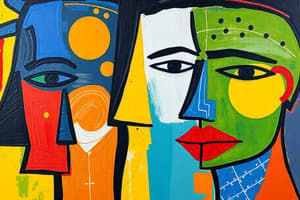Podcast
Questions and Answers
What is primarily focused on in the study of humanities?
What is primarily focused on in the study of humanities?
- Cultural enhancement and refinement (correct)
- Scientific advancements and technology
- Physical fitness and health
- Economic theories and practices
Which of the following best describes the origin of the term 'culture'?
Which of the following best describes the origin of the term 'culture'?
- From ancient Egyptian practices of art and music
- From Old English terms denoting social hierarchies
- From Greek terms related to philosophy and ethics
- From Latin terms meaning to cultivate and develop (correct)
How does studying humanities help in understanding history?
How does studying humanities help in understanding history?
- By focusing solely on modern events
- By providing exact dates and facts
- By discounting personal experiences
- By realizing differing interpretations of life and history (correct)
What is a fundamental principle of the humanities?
What is a fundamental principle of the humanities?
One reason to study humanities is to:
One reason to study humanities is to:
How do humanities studies contribute to our understanding of the present?
How do humanities studies contribute to our understanding of the present?
What is an outcome of engaging with the humanities?
What is an outcome of engaging with the humanities?
Why is it advantageous to learn about different cultures through the humanities?
Why is it advantageous to learn about different cultures through the humanities?
What is a defining characteristic of theater as an art form?
What is a defining characteristic of theater as an art form?
Which of the following best describes film?
Which of the following best describes film?
What distinguishes literary arts from other art forms?
What distinguishes literary arts from other art forms?
Which statement is true about digital arts?
Which statement is true about digital arts?
What is a key feature of pop arts?
What is a key feature of pop arts?
What is the essence of creativity in art?
What is the essence of creativity in art?
What does the term 'art' primarily imply according to its etymology?
What does the term 'art' primarily imply according to its etymology?
Why is it said that imagination is more important than knowledge in the context of art?
Why is it said that imagination is more important than knowledge in the context of art?
Which of the following best describes the impact of refining one's ability to appreciate art?
Which of the following best describes the impact of refining one's ability to appreciate art?
What is an important aspect of creativity when it comes to originality in art?
What is an important aspect of creativity when it comes to originality in art?
How does an individual's appreciation for art influence their life choices?
How does an individual's appreciation for art influence their life choices?
How can imagination contribute to the process of creating art?
How can imagination contribute to the process of creating art?
What do the Latin terms ARS and ARTIS suggest about art?
What do the Latin terms ARS and ARTIS suggest about art?
What distinguishes 2-dimensional art from 3-dimensional art?
What distinguishes 2-dimensional art from 3-dimensional art?
Which material is NOT commonly used for painting?
Which material is NOT commonly used for painting?
What is the primary medium used in performing arts?
What is the primary medium used in performing arts?
What defines the art of architecture?
What defines the art of architecture?
Which of the following best describes 'plastic arts'?
Which of the following best describes 'plastic arts'?
What aspect of performance art makes it intangible?
What aspect of performance art makes it intangible?
Which type of dance includes a strong emphasis on rhythm and cultural expression?
Which type of dance includes a strong emphasis on rhythm and cultural expression?
Which of the following types of music is primarily characterized by vocal performances?
Which of the following types of music is primarily characterized by vocal performances?
What is the primary purpose of an artist in relation to emotions?
What is the primary purpose of an artist in relation to emotions?
What differentiates expressing emotions from describing them in art?
What differentiates expressing emotions from describing them in art?
Which of the following statements best reflects the timeless nature of art?
Which of the following statements best reflects the timeless nature of art?
In art, what does 'imitation' primarily refer to?
In art, what does 'imitation' primarily refer to?
What is the first step in the system of art appreciation?
What is the first step in the system of art appreciation?
Which element is NOT typically analyzed in the analysis stage of art appreciation?
Which element is NOT typically analyzed in the analysis stage of art appreciation?
What does the interpretation stage in art appreciation seek to do?
What does the interpretation stage in art appreciation seek to do?
Which of the following best describes art?
Which of the following best describes art?
Flashcards are hidden until you start studying
Study Notes
Humanities
- Emphasizes qualities like rationality, kindness, and tenderness, reflecting true human nature.
- Encompasses the study of human thoughts, feelings, and relations, serving as an expression of culture.
Culture
- Derived from Latin "cultus" meaning to cultivate or develop.
- Represents the collective lifestyle of a society including beliefs, customs, art, and traditions.
- Humanities aim to understand these cultural expressions.
Importance of Studying Humanities
- Enhances employability by fostering empathy and interpersonal understanding.
- Provides insight into history, shaping present-day culture.
- Connects literature and art with past societal achievements.
- Facilitates appreciation of history, music, art, philosophy, and literature, enriching human experience.
Benefits of Humanities Study
- Promotes understanding across diverse backgrounds: race, class, gender, and ethnicity.
- Highlights the interconnectedness of knowledge areas.
- Broadens exposure to unfamiliar cultures and innovative ideas.
- Encourages a global perspective through cultural studies and artwork appreciation.
- Strengthens local arts community and creativity recognition.
- Addresses societal challenges by valuing human dignity.
Fundamental Principles of Humanities
- Aims for the development of human virtues and social understanding.
- Focuses on reforming social structures based on intrinsic human nature.
Nature of Art
- Originates from the Aryan root "AR", meaning to join or assemble.
- Involves creation through skillful arrangement, expressing human emotions and thoughts.
- Fosters appreciation of beauty in art and enhances decision-making in arts and life.
Role of Creativity in Art Making
- Creativity distinguishes unique artworks from imitations.
- Originality and boldness are key to artistic expression.
Art and Imagination
- “Imagination is more important than knowledge” - Albert Einstein, showcasing the limitless nature of creativity.
- Art can originate from imaginary concepts, influencing and inspiring other imaginative works.
Art as Expression
- Artists express emotions rather than merely depict them, creating beautiful outputs from personal feelings.
- Art embodies a subjective reflection of inner sentiments.
Assumptions of Art
- Recognized as timeless and appreciated across generations, transcending cultural and temporal boundaries.
- Not merely an imitation but a clear and meaningful expression of nature and life experiences.
Systems in Art Appreciation
- Describe: Identify details about the artwork including artist, medium, and historical context.
- Analyze: Examine artistic elements like shape, color, and visual impact.
- Interpret: Explain personal meanings and significance of the artwork.
Types of Arts
- Space Arts: Visual expressions, including paintings (2D) and sculptures (3D).
- Time Arts: Auditory expressions such as music and dance.
- Literary Arts: Written forms like poetry and novels characterized by expressive language.
- Digital Arts: Art created digitally, encompassing graphics and electronic media.
- Pop Arts: Engaging, lively artworks reflected in media forms.
- Gustatory Art: Culinary arts showcasing food preparation as skillful creativity.
- Decorative Arts: Aesthetic design elements in architecture and interior spaces.
Performing Arts
- Encompasses live expressions using the human body, including dance, music, theater, and film.
- Unique for its intangible nature, relying on the experience of the live performance.
Studying That Suits You
Use AI to generate personalized quizzes and flashcards to suit your learning preferences.



